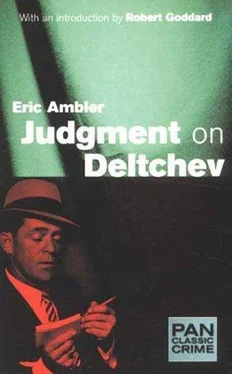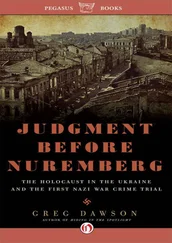Eric Ambler - Judgment on Deltchev
Здесь есть возможность читать онлайн «Eric Ambler - Judgment on Deltchev» весь текст электронной книги совершенно бесплатно (целиком полную версию без сокращений). В некоторых случаях можно слушать аудио, скачать через торрент в формате fb2 и присутствует краткое содержание. Год выпуска: 1977, ISBN: 1977, Издательство: Vintage, Жанр: Криминальный детектив, на английском языке. Описание произведения, (предисловие) а так же отзывы посетителей доступны на портале библиотеки ЛибКат.
- Название:Judgment on Deltchev
- Автор:
- Издательство:Vintage
- Жанр:
- Год:1977
- ISBN:9780307049971
- Рейтинг книги:4 / 5. Голосов: 1
-
Избранное:Добавить в избранное
- Отзывы:
-
Ваша оценка:
- 80
- 1
- 2
- 3
- 4
- 5
Judgment on Deltchev: краткое содержание, описание и аннотация
Предлагаем к чтению аннотацию, описание, краткое содержание или предисловие (зависит от того, что написал сам автор книги «Judgment on Deltchev»). Если вы не нашли необходимую информацию о книге — напишите в комментариях, мы постараемся отыскать её.
Judgment on Deltchev — читать онлайн бесплатно полную книгу (весь текст) целиком
Ниже представлен текст книги, разбитый по страницам. Система сохранения места последней прочитанной страницы, позволяет с удобством читать онлайн бесплатно книгу «Judgment on Deltchev», без необходимости каждый раз заново искать на чём Вы остановились. Поставьте закладку, и сможете в любой момент перейти на страницу, на которой закончили чтение.
Интервал:
Закладка:
‘Afraid?’ he exclaimed derisively. ‘The Minister is afraid to answer?’ He gave a short laugh. ‘It is not the Minister who is afraid. It is you, Deltchev! No wonder you seek to accuse and discredit the witnesses against you. You are in fear of your life. No wonder you tremble. No wonder you keep your hands in your pockets. Do you think we do not notice? Ah, but the people have eyes, Deltchev. You cannot deceive them for ever. You may disguise your fear in other ways, but your trembling hands you dare not let us see. Come, show us your hands, Deltchev. Or else be silent while justice is done.’
In the breathless hush that descended, there was one single quickly suppressed giggle and then no sound but the fluttering of the cameras. The Prosecutor had a hard, ugly little smile on his lips. At that moment he was not absurd. Vukashin looked down at his own hands, frowning. Deltchev stood quite still, his face expressionless. He was making up his mind.
Then he took his hands out of his pockets and held them out, palms downward, in front of him. They shook with a coarse tremor that must have been visible at the back of the court.
‘The prisoner’s hands are more truthful than his tongue,’ said the Prosecutor.
Without a glance in his direction Deltchev put his hands back in his pockets and raised his head.
‘I speak,’ he said loudly, ‘to the members of the Diplomatic Corps present here and to the representatives of the foreign press.’
There was another commotion in the front of the court, and the Prosecutor began to protest to the judges. The interpreter began to translate the protest and I took my earphones off. Others beside me were doing the same. Deltchev had spoken in German.
‘You may have formed your own conclusions,’ he went on, ‘about the quality of the evidence that will be given by the Prosecution in this court. In case you are in doubt, this demonstration will convince you. The evidence of my own hands has now been offered against me. I will explain what it is worth.’
With an elaborately satirical bow in the direction of the diplomatic and foreign-press sections, the Prosecutor abandoned his protest and stood, his arms akimbo and an unsuccessful attempt at a smile on his face, looking up at the ceiling.
‘I make no defence of myself in offering this explanation,’ Deltchev was saying. ‘My defence is in the safe hands of the prosecution.’ He smiled faintly. ‘But perhaps you will be interested in this fact. I give it to you merely as a point of interest.’
He paused and then went on very deliberately, ‘Gentlemen, I am a diabetic and have been so for several years now. That has meant, of course, a careful diet balanced with injections of insulin. The amount of insulin I need is not great — twenty units in the morning and twenty at night. I can, of course, call medical witnesses to prove this. When I was first arrested, the prison doctor was authorized to supply me with insulin. He even increased the injections slightly to compensate for the change in diet. Five weeks ago I was moved to another part of the prison and was not allowed to see the prison doctor. For just over four weeks I have been without insulin. The symptoms of diabetes have therefore returned — thirst, fatigue and other disagreeable manifestations, which I shall not trouble you with. The trembling of my hands is part of my general weakness and debility. If the Prosecutor had asked me to show you my knees, you would have seen that they also tremble.’ He looked round at the prosecutor for a moment and then turned back to us. ‘I think that if he had known of this illness he would not have drawn your attention to it in this way. It is no part of his task to create sympathy for me. I merely ask you to note that he makes wrong deductions even from facts. The fantasies that he will create from the falsehoods his case rests upon I leave to your imagination.’
Then he sat down.
The Prosecutor said something quickly to the judges. The centre judge said something in reply. I put the earphones on again and caught the translation.
‘The presiding judges rule that the remarks of the prisoner shall not be entered in the record, as they were made in a foreign language not intelligible to the court. The case is adjourned until tomorrow.’
The court rose.
When the judges had gone, Deltchev stepped down from the rostrum and with his own guards walked slowly toward the glazed doors. Nobody else in court moved. They watched him. At the door he paused and looked back. Then with a small, friendly nod he turned away again and went on through the doors.
I looked at Pashik. He was standing stiffly and awkwardly as if caught in the act of rising. He did not seem to notice his discomfort. He looked at me rather strangely. ‘A good man, Mr Foster,’ he said softly, ‘in his way, a great man.’
But I did not pay much attention to him. Even now I can remember everything I thought during that next half-hour. I was very shocked by what I had seen and heard and full of hatred for the People’s Party regime. I think that if I had met Dr Prochaska in the corridor outside the courtroom I should have hit him. But soon I began to think more reasonably.
Nobody, I thought, could share the experience I had just had without also sharing my passionate indignation at what was being done in that sunny courtroom. If I could convey the scene with even a tenth of the impact it had in reality, I would arouse a storm of anger that might damage the regime appreciably. And then an idea began to form in my mind of how I might write about the Deltchev trial.
This, I thought suddenly, was more than just the crooked trial of a politician by his more powerful opponents. Here, epitomized, was the eternal conflict between the dignity of mankind and the brutish stupidity of the swamp. Deltchev, sick and alone, knowing that nothing could save him from a verdict and a sentence already decided upon, was yet prepared to go on fighting for the truth he believed in. Dimitrov at the Reichstag fire trial had fought for his life and won. Deltchev’s life was already forfeit, but he was fighting nonetheless and might win a greater victory. And the fight was of his own choosing. Months back he could have escaped abroad and made the Government’s task easy. He had not done so. Long-forgotten sentences began to run through my mind.
Will you then flee from well-ordered cities and virtuous men? And is existence worth having on these terms? Or will you go to them without shame, and talk to them, Socrates? And what will you say to them? What you say here about virtue and justice and institutions and laws being the best things among men? Would that be decent of you? Surely not … Will there be no one to remind you that in your old age you were not ashamed to violate the most sacred laws from a miserable desire for a little more life?… This, dear Crito, is the voice I seem to hear murmuring in my ears, like the sound of a flute in the ears of a mystic …
I was deeply moved. I was also beginning to enjoy myself.
And then I got back to my hotel, and Petlarov was waiting in the corridor.
We went into my room and I told him what had happened.
He nodded coolly when I had finished. ‘Oh yes. Poor Yordan. He is certainly not strong. But how foolish of them not to tell Prochaska how the victim was being prepared! But we may expect foolishness. You see, they have always been able to rely before upon the folly of others. Now that they have to rely on themselves, their deficiencies are revealed. Of course an incident like that will make no difference to the outcome of the trial.’
‘No, but it will make a great difference to the comments on the trial in the Atlantic countries.’
‘The comments of the West did not save Petkov or Mindszenty. I think it is interesting, however, in quite a different way.’ He smiled thinly. ‘Why do you think Yordan made this demonstration? What did he hope to gain by it?’
Читать дальшеИнтервал:
Закладка:
Похожие книги на «Judgment on Deltchev»
Представляем Вашему вниманию похожие книги на «Judgment on Deltchev» списком для выбора. Мы отобрали схожую по названию и смыслу литературу в надежде предоставить читателям больше вариантов отыскать новые, интересные, ещё непрочитанные произведения.
Обсуждение, отзывы о книге «Judgment on Deltchev» и просто собственные мнения читателей. Оставьте ваши комментарии, напишите, что Вы думаете о произведении, его смысле или главных героях. Укажите что конкретно понравилось, а что нет, и почему Вы так считаете.












